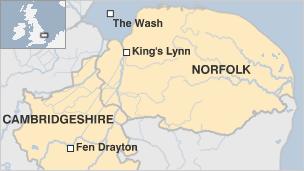Seal seen at Drayton Lakes Reserve - 50 miles from sea
- Published
Robjn said at first sight he thought the seal was a dog in trouble - courtesy YouTube/Robjn
A seal is thought to have swum more than 50 miles (80km) along a flooded river to an RSPB nature reserve, where it was filmed "hopping" into a lake.
The marine mammal was filmed in a YouTube clip, external, published on Sunday, in a lake at Fen Drayton Lakes Reserve, in Swavesey, Cambridgeshire.
Graham Elliott of the RSPB said it was a "surprising" but not unique sighting.
"You occasionally get seals in the River Ouse near St Ives but I've never known of one here before," he said.
"The surprising thing was to see it leaving the river and hopping over the bank, entering the gravel pits area."

Thought by experts to be a common seal, the footage shows the seal battling to cross a barrier to get into a lake on the RSPB site.
The 29-year-old man who captured the footage said he initially thought he had seen a dog when he approached the area while on a walk with a friend at about 13:45 GMT on Sunday.
"At first sight, I thought it was a dog in trouble but as it came up for air I could see it was a seal," said the man, who wanted to be known as Robjn.
"It was swimming up a ditch that links to the Great Ouse. In the video, it is swimming from the ditch up into the flooded field.
"It had a few tries at different points of climbing the bank but in the film was the successful attempt. After that point we didn't see it again."
Plenty of food
Water levels have remained high following recent heavy rain in the area, leading to the river flooding nearby fields.
Mr Elliott said the creature could prove to be a "great visitor attraction", although it has not been seen since the footage was taken.
"If anybody does see it, we'd love to hear the news," he said.
"It was probably just exploring new views."
Mr Elliott said the RSPB would monitor the situation and there was no apparent cause for concern.
"It's perfectly happy in the lake with plenty of food to sustain it. It's not a threat to any other wildlife and hopefully it will find its way out the same way it came in," he said.
"If it can't, we'll then consult with the RSPCA to make a decision on what will happen next."
- Published3 October 2012
- Published24 August 2012
- Published15 August 2012
- Published6 January 2012
- Published5 January 2012
- Published15 January 2011